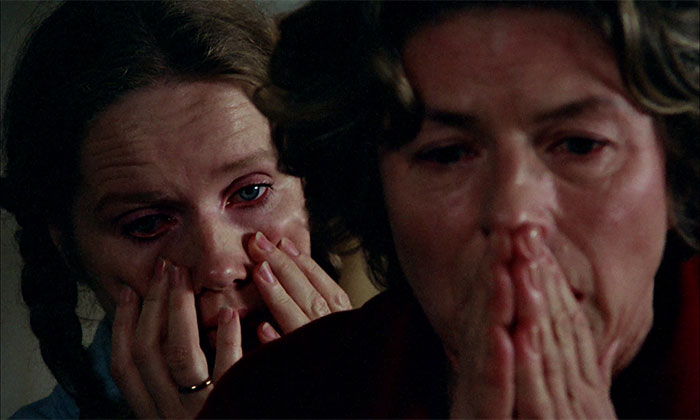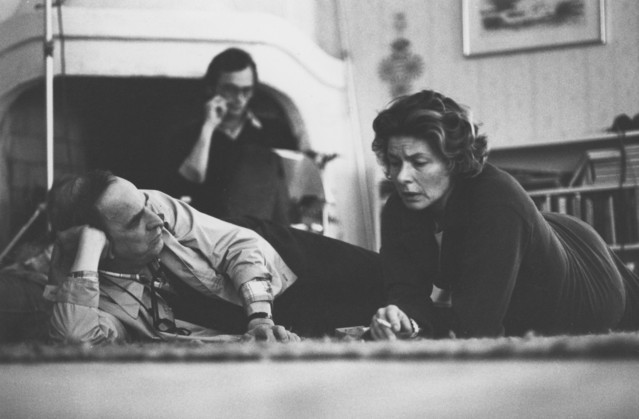Autumn Sonata: Ingrid's Swan Song
 Saturday, August 29, 2015 at 10:39AM
Saturday, August 29, 2015 at 10:39AM Happy Ingrid Bergman Centennial! The great movie star was born 100 years ago on this very day in Stockholm, Sweden. Jose closes out our 10 film retrospective with a look at her final feature film - Editor

Jose here. True story: there was a time when I thought Ingrid Bergman and Ingmar Bergman were the same person. Not because I had seen Persona and dreamt of metaphysical unions between both great Swedes, but merely because I was a child.
I first laid eyes on Ingrid on the box of my grandma’s tape of Casablanca, when I was 6, and there was something about those eyes filled with longing and sorrow that one day drew me to insert the tape into the player. Bewitched by the earthy qualities and the warmth she exuded, I devoured as many of her films as I could get my hands on, until one day I heard someone talk of Ingmar. Convinced that it was merely a mispronounced version of Ingrid’s name I remained oblivious until the day I saw The Seventh Seal at age 12. The more I learned of Ingmar’s work in the following years, the less I thought there would be room for Ingrid in his world of damaged, oft cold human beings.
Then I watched Autumn Sonata and not only did she make sense in Ingmar’s universe, it seemed to be the place she was born to be in. Playing world famous pianist Charlotte Andergast, the director allowed her beautiful features to reflect a severity she had merely suggested in earlier roles during her career, as if she chose not to be breathtaking. The film has Liv Ullmann play Charlotte’s daughter Eva, who resents her mother for not having been around much when she was a child. To say that their exchanges are unkind would be an understatement, when every word seems like a dagger aimed for the ultimate kill.
 Cinema's Legendary Bergmans. No relation.
Cinema's Legendary Bergmans. No relation.
Ingmar’s kind of existentialism often drew from his own life, but in Autumn Sonata he seems to have made a film all about Ingrid. For starters, the very notion of a mother abandoning her children was something that allegedly tormented Ingrid who left her own child in America to pursue a relationship with director Roberto Rossellini in the 1950s, in traditional Bergman fashion though, Charlotte isn’t entirely filled with regret though, and she seems pleased with having Eva’s contempt, rather than having spent her life pretending she wanted to be with her children. It’s a bold performance that breaks from the nurturing qualities Ingrid had shown all throughout her career.
Charlotte turned out to be the Oscar winner’s big screen swan song, she would then go into semi-retirement only to act in a Golda Meir biopic that would win her an Emmy and a Golden Globe, but her work in Autumn Sonata makes for a beautiful bookend when juxtaposed with her first big role in Intermezzo. In fact, we could propose a theory that Charlotte is another version of Intermezzo’s Anita Hoffman, in fact she could even be the same woman, a professional musician who realizes her art is more important than anything else in the world, after being subjected to endless heartbreak at the hand of the man she loves. It’s a thing of beauty to realize that she had been showing us shades of Charlotte more than 40 years before. Could it be that Ingmar had seen Intermezzo as a young man and dreamed this part for his leading lady before he began his own career? Even though Ingrid and Ingmar weren't the same person after all, they were meant to do transcendental art together all along.

previously: Intermezzo (1939), Dr Jekyll & Mr Hyde (1941), For Whom the Bell Tolls (1942), Notorious, (1946), Joan of Arc (1948), Journey to Italy (1954), Indiscreet (1958), The Inn of Sixth Happiness (1958), Cactus Flower (1969) and 10 Best Ingrid Bergman Kisses (1935 through 1970)



Reader Comments (14)
WOW didn't she win.
Great write-up for Autumn Sonata, which is a film that could be talked about for hours. I first saw it when I was 16 and recovering from getting my wisdom teeth removed. Lying in bed, with ice packs on my face, Ingmar's style seemed to fit my situation. Nearly ten years later, I still think about Ingrid's performance opposite Liv Ullmann. They chose to give Jane Fonda Oscar number two instead of making Ingrid the sole grand dame (at least for three more years). I bet if Ingrid hadn't won in '74, she'd have won here. But maybe Jill Clayburgh deserved it for An Unmarried Woman? I love the Oscars.
LOL, Jose. I thought Ingmar and Ingrid were one as well. ("She directs, too?!")
Anyway, I think Jill Clayburgh gave an iconic performance, but who could top Ingrid in Autumn Sonata?
I never mistook them for each other but I had assumed they were related until I discovered that the last name Bergman is the Smith of Sweden.
It's tough to win for a foreign language performance but I think if Ingrid hadn't won so recently for Orient Express being who she was she could have pulled off a win here. She certainly deserved it far more than the earlier one but as the academy did with Kate Hepburn with Guess Who's Coming to Dinner they assumed that Ingrid's glory days were behind her and wanted to bestow an honorific to her.
Although I don't love the film overall this is a fine piece of unusual work from her and a wonderful capstone to her film career. Thank goodness she had the opportunity to finish up on such a high note and not have to exit in squalid junk as did the Misses Davis, Crawford, Lake and Hopkins.
It's rare for a film performer to have their final film performance possible be their best and Bergman is a great example of this because she is glorious in the film. I can see how Fonda won back then because she's great but really when you compare her work to Clayburgh and especially Bergman it's no question Fonda won her second Oscar for the wrong performance (Her work in China Syndrome would have been a more worthy second win).
It's funny because I've only seen the movie once, but I've seen it as a stage play twice. It's usually quite the opposite!
Let me mention two movies I immediately relate to this one: 'night, Mother and Almodóvar's High Heels. Mother and daughter relationships are like heaven for actressexuals.
God I adore this film and her performance and Ullmann's performance. I don't know which of the two I prefer. I suppose Bergman left a greater impact on me - and the boldness of the character played its part in that. But I just adore Ullmann's neglected-child-grown-into-adult-neurotic voice and the way she cuts off one of Bergman's most impassioned (and powerful) monologues with just a casual, half-muttered 'no' and a head shake that is just staggering in its genius and how much it tells about this relationship's history.
I can kind of see the charge that the film is 'Ingmar-Bergman-by-numbers'. But I don't see how that's a bad thing, and I still don't understand why it's so ridiculously undervalued.
I saw this about ten years ago on DVD and remember thinking Ingrid was magnificent but Liv Ullmann painfully overwrought.
Jose is spot on when he refers to words in the film being 'like a dagger aimed for the ultimate kill' as Ullmann seems to make every scene a life-and-death struggle for her character. I don't remember their performances sitting comfortably together at all, and I was on Ingrid's character's side all the way, despite all that she'd done, because I couldn't stand her daughter!
Ingrid Bergman wanted this to be her last film because she liked the symmetry of her first film and her last film both being about characters who are concert pianists.
Of course she knew at the time that she had cancer and that there was relatively little time left for her. She accepted life with such grace and brought so much of that to this performance.
Thanks so much for the articles for her centennial, you did this grande dame of cinema justice.
AUTUMN SONATA is a stunning film. The scene where the two of them play the same Chopin prelude, with Ingrid tearing her daughter's rendition to ribbons, left an apparently indelible mark on me. I saw the movie years ago and barely remember most of it, but that sequence still stings every time I think about it.
I agreed tt had Ingrid not won 4 yrs ago, she wld probably won her 3rd Oscar for this. I thot both Ingrid & Liv complimented ea other v well....Its so rare tt Ingrid play such an unsympathetic role...other famous actresses wld probably b too image conscious & wld hav snucked in a few elements/explanations to justify Charlotte's actions, but not Ingrid. She played it straight, letting u kno tt given a choice again, Charlotte wld still pick her career over her children.
I tink the similarity was not lost on Ingrid. She must hav realised upfront tt Charlotte is thinly veiled poke at her abandonment/neglect of her own children. Kudos to her for still taking up the challenge & ace it!!
I'm quite surprised tt Autumn Sonata was not nom for best foreign pic that yr (WTF!!) . It was only nom for Best Actress & Screenplay. It did however won the Golden Globe for best foreign pic & Ingrid, the triple critics prize (New York Film Critics, National Board of Review, & National Society o Film Critic).
This is one of both Bergman's finest hour, really wish it had won the Oscar for best foreign pic. thr wld have been a perfect closing to Ingrid's cinematic career
This is my favourite Bergman film and favourite Bergman performance. Quite fitting, really.
Second or third-tier (Ingmar)Bergman, with first or second-tier Bergman (Ingrid). As usual when his movies coast, people shout their anxieties at each other without dramatizing her. Ingrid is fun, but I still think Clayburgh should have won this year.
Ingrid was robbed of a well deserved Oscar! Well, the AMPAS routinely got it wrong. For the four wins by Hepburn, only Lions in Winter is worthy. I cannot believe that Bergman did not receive noms let alone wins for Casablanca and Notorious.
I have no problem nominating her for Stromboli, Europa 51, Journey to Italy, Fear, Inn of the sixth happiness and Cactus flowers.